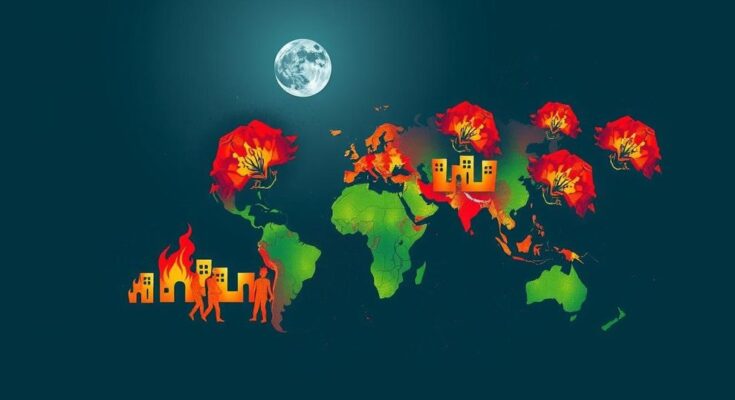During the UN climate talks, negotiators from developing nations rejected a proposed funding deal, citing dissatisfaction with financial support aimed at combating climate change. Tensions escalated as many delegates walked out, voicing concerns that the offered amounts were inadequate. Calls for a more comprehensive agreement continue as negotiations proceed, with a looming deadline for final decisions.
As the United Nations climate talks extended into overtime, tensions escalated among negotiators from both developed and developing nations. A proposed financial deal aimed at aiding developing countries in mitigating and adapting to climate change was met with significant rejection, particularly from African nations and small island states. Frustration boiled over when members of the Least Developed Countries group and the Alliance of Small Island States opted to walk out, citing dissatisfaction with the rough draft of the proposal. Evans Njewa, chair of the LDC group, expressed their stance, stating, ” The current deal is unacceptable for us. We need to speak to other developing countries and decide what to do.” This sentiment was echoed by Colombian Environment Minister Susana Mohamed who noted, “We are highly dissatisfied.” Climate activists also voiced their discontent, targeting the United States climate envoy, John Podesta, for perceived inadequacies in America’s financial contributions.
The previous draft proposal pledged $250 billion annually by 2035, well below the over $1 trillion experts assert is required, while a newer discussion suggested an increase to $300 billion. Developing nations accused wealthier countries of engaging in a prolonged struggle, favoring a limited financial aid package instead of a comprehensive solution. Many delegates underscored that as time passed without resolution, their negotiating power diminished, often leading to exhaustion and desperation. Panama’s chief negotiator, Juan Carlos Monterrey Gomez, remarked on the detrimental dynamics at play, stating, “Every minute that passes we are going to just keep getting weaker.” This concern over potential compromises loomed large among poorer nations, as underscored by Mohamed Adow of Power Shift Africa.
Developing nations are advocating for $1.3 trillion to effectively adapt to extreme climate impacts and transition towards sustainable energy sources, stemming from a commitment made in Paris in 2015. However, the figures discussed in Baku still fell short of their needs, leading Monterrey Gomez to assert that even the discussed $300 billion figure constituted mere “crumbs” in the face of what is necessary.
Throughout the discussions, the urgency for financial mechanisms, such as carbon markets, was emphasized as critical to reaching the proposed $1.3 trillion, but many expressed concerns about loans exacerbating existing debts. Ali Mohamed, chair of the African Group of Negotiators, confirmed their willingness to reach an agreement, contingent upon respect for their demands. Despite the evident divisions, some officials maintained optimism for productive negotiations moving forward.
The ongoing United Nations climate talks represent a critical intersection of global policy-making, aimed at addressing the adverse effects of climate change, particularly for developing regions. This year’s negotiations have highlighted a stark divide between wealthier nations and those most affected by environmental issues, spotlighting funding as a pivotal element of the discussions. The agreement forged in Paris in 2015 has created obligations for rich countries to assist vulnerable nations, but the current proposals have encountered significant pushback due to perceived inadequacies and imbalances in financial commitments. This situation has led to heightened tensions and increasing frustration among developing nations as they navigate their urgent needs against the backdrop of global political maneuvering.
In summary, the United Nations climate talks are fraught with tension as developing nations reject proposed financial commitments that fall short of their needs to combat climate change. The significant disparity in funding expectations has spurred walkouts and protests, emphasizing the urgency for a more robust financial framework to support vulnerable countries. The ongoing negotiations in Baku will dictate the path forward, as many officials remain hopeful for a resolution that honors previous commitments while adequately addressing the climate crisis.
Original Source: www.voanews.com




